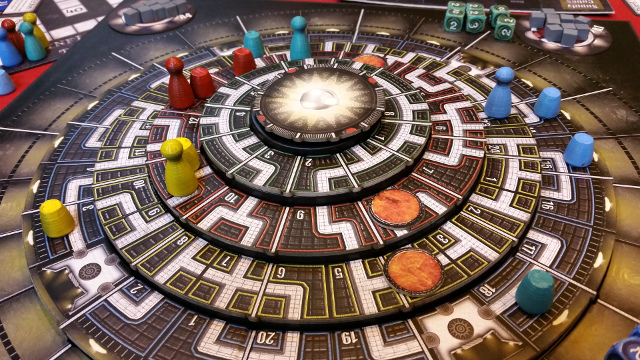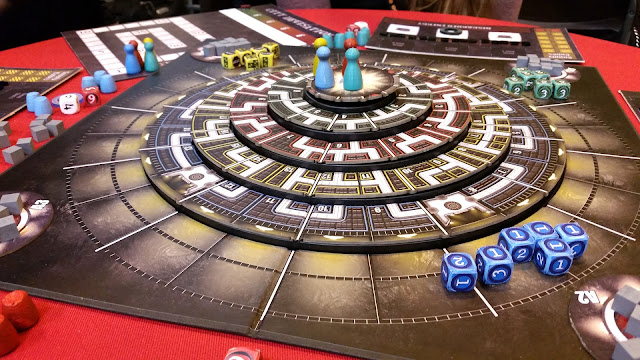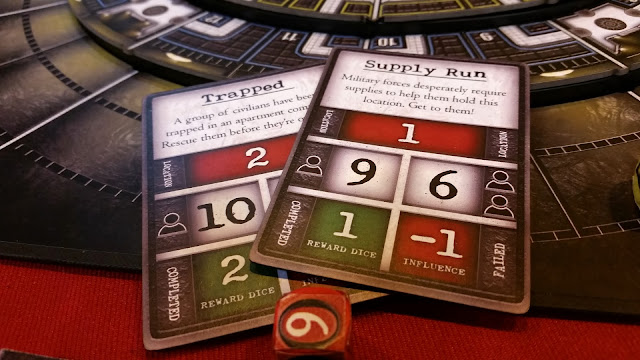
Now, it’s a well-established fact that here at Polyhedron Collider we do like a bit of novelty and bling in our games. And if there’s a chance to play nice then stab someone in the back without so much as a “by your leave”, then we’re all for it. So what happens when you combine all three? You get Everdark by Walrus Games – the pre-release version of the game I was taken through at UK Games Expo.
Back in the pre-industrial dystopia of May 2016, we posted a “games to look out for at the Expo” which included Everdark. Yes, we’ve had our eyes on this one for quite some time, myself especially being Polyhedron Collider’s “King of Bling”. Everdark is certainly not short of style or looks; it grabs your attention the same way cheesecake gains the interest of a group of dieters on hunger strike.
Everdark’s premise is quite straightforward – the city of Phos, a beacon of light, is surrounded by an everlasting darkness (see what they did there?) and recently, the leader of the city perished allowing the Everdark to encroach on the city. It’s time for a new leader to emerge, but the city needs to be saved in the process. It’s an interesting mix of co-operative and self-serving gameplay in a unique environment. Players work together to save the city, but individuals are trying to be the overall leader of Phos.
The first thing that struck me (and pretty much everyone else) about Everdark is the unique structure of the game: a series of concentric rings forming the city of Phos, rising upwards towards the centre where the beacon sits. Just beyond the city lie four resource pools which will assist players in saving the city, although they are limited in supply.
The gameplay is fuelled by the idea that the city is falling apart – players must work to perform tasks which must be completed by expending energy, resources or both. Each task has an associated cost and a suitably nice reward for completing it. The combination of a D6 roll and your choice of energy and resources are up to you. You can re-roll, but the longer you take, the less time you have to complete the tasks. Oh, did I mention? The game is against the clock too so there’s no room for dilly-dally and anyone caught with analysis paralysis won’t be too popular. You can ask other players for help with task completion; if they help, it’s cheaper to complete, but they get a share of the reward. Complete the task and you get resources for future events. Fail and that part of Phos is lost forever.
Moving about Phos is where the game’s uniqueness really shines through. Players get four actions per turn, which can be spent in any combination of avatar movement or rotating any the city’s four rings. That’s right – the city can change configuration as you play which can be used to help (if you’re playing nice) or hinder (if you’re Polyhedron Collider’s Jon) your allies. Ultimately, there can be only one winner, so tables (and city levels) can turn very quickly when it comes to the crunch.
Talking to the game’s designer, Ed, he was in a bit of shell-shock from all the attention the game received – and rightly so in my not-so-humble opinion. It’s a great looking, very well designed game and just like the city it represents, stood out like a beacon amongst many of the games on offer. Ed’s happy to admit the game still needs some minor tweaking based on the deluge of positive feedback he’s received, so it can only get even better. Ed’s pushed the original Kickstarter date back to work on the tweaks, but it looks on course for the end of August 2016.
Based on what I’ve seen so far, we’re in for a real treat.
This review is based on a prototype version of the game played at the UK Games Expo with the designer; the final product may look, play or smell different to that used in this article.



Comments
Post a Comment